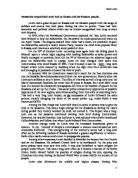Among the first things that Lenin did when he came to power, was to give the land to the peasants. This was a major change for the Russians as during the Tsar’s ruling period they mainly worked the land, not owned it. This impact was a long-term one as the peasants continued owning their land during Communism. However, the relative freedom they had over it, was reduced when Stalin introduced Collectivisation, and before that when Lenin initiated War Communism.
Another change made by Lenin was the increased importance given to women. In the ‘Council of People’s Commissars’ a woman was included as well, Alexandra Kollontai. This strengthening of the women’s status had a long-term effect as the following leaders of Russia accorded a greater significance to women - Stalin often used a woman and a man in propaganda posters.
Among other measures, Lenin decided to diminish the impact that the Church had on the Russians. He ordered Church land to be confiscated by the state and some priests were even sent into exile. It was also forbidden to teach religion for people under fifteen. This was a long-term effect as it became a feature of the Soviet Union. Stalin himself forbid the practice of religion during his rule, opening the Churches only once during the Second World War to boost briefly the morale of the people.
Lenin also eliminated the middle and higher classes. During War Communism many middle-class people sold their belongings to survive, while some nobles fled abroad. This remained the same during the 74 years of Communism in Russia, thus it can be considered a long term impact.
As ending the war was crucial for the Russians at the time Lenin became leader, he sent Trotsky to negotiate peace with the Germans. The result was the harsh Treaty of Brest-Litovsk, which’s short term impact was that Russia dropped out of the First World war and was able to concentrate on her internal affairs. However Russia lost huge amounts of territory and natural resources as well, which is a long term impact.
To consolidate his power, Lenin decided to get rid of all the enemies of the Communists. During the Civil War he fought with ex-Tsarists, Social Revolutionaries and even foreign capitalist countries. Short term impacts of the Civil War were the millions of deaths and the victory of the Reds, reinforcing the control of the Communists. However the hostility towards capitalist countries remained and its long-term impact was 40 years of Cold War and the breakdown of the relatively good international relations which Russia had with some capitalist countries after World War 2.
During the Civil War the Reds executed the Tsar and his family. The long-term effect of this was the definite end to the 300 year old Tsarist regime and the replacement of it with Communism.
Lenin introduced War Communism from 1918 till 1921 to combat the economic problems brought on by the Civil War in Russia. By 1921 the economy of Russia was in ruins and industrial production had fallen disastrously. Cities were in chaos and agriculture collapsed as well as the peasants saw no point in growing extra grain as it would be seized by the Reds. In 1921 famine hit the countryside taking with it 5 million lives. However due to this harsh policy the Red Army was well fed and equipped with weapons produced by the state controlled factories. All these were short term impacts, and War Communism itself didn’t last long, as in 1921 Lenin introduced the New Economic Policy. However, the new, state controlled economy and the seizure of grain from the peasants can be considered a long-term impact as well, as later on Stalin introduced a regime including both of these ideas, which became a feature of the Soviet Union.
In 1921 Lenin introduced the New Economic Policy. This strengthened foreign trade and 1921 marked the beginning of increased trade with the West which gave a great boost to the Soviet Economy. The NEP lasted until 1928 and during this period of time Russia generally became more prosperous. However, the impacts of this policy were short, as soon after Lenin’s death when Stalin emerged as leader, NEP was abolished as it wasn’t considered to be ‘Communistic’ enough and Stalin believed that only a state planned economy could help Russia to become a powerful and modern industrialized country. He also minimized foreign trade with the West as the hostility between the Communists and Capitalists grew stronger.
It is easy to see that Lenin had and immense impact both on Russia and its inhabitants. Short term political and economic impacts brought major and almost sudden changes to the Russians. The people barely had time to realize that the 300 year old Tsarist regime ended, that Lenin had overthrown the Provisional Government and introduced a completely different style of leadership under Communism. During the next five years he first introduced war Communism, causing the victory of the Red Army, but a devastating harvest in 1921, and then the NEP, which brought a rapid, but short-term increase in standards of living. Even after his death, his ideas influenced significantly the course of history, both of Russia’s and the world’s. For more than seven decades Communism and the command economy survived in Russia, and leaders after leaders followed Lenin’s ideas about Communism put into practice.








